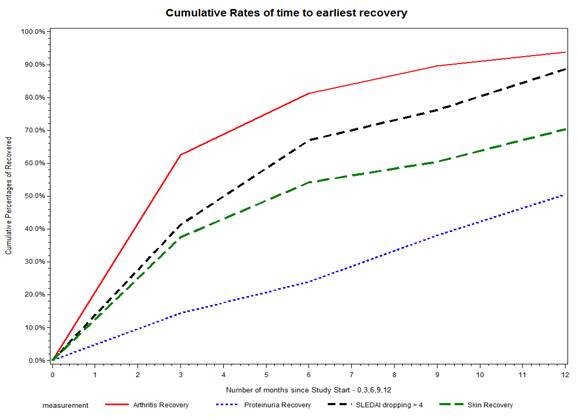Session Information
Date: Tuesday, November 10, 2015
Title: Systemic Lupus Erythematosus - Clinical Aspects and Treatment Poster Session III
Session Type: ACR Poster Session C
Session Time: 9:00AM-11:00AM
Background/Purpose:
Musculoskeletal,
dermal and renal systems are the most commonly represented systems in lupus
clinical trials. Thus, it is very important to study the time to recovery in each
individual system on standard of care treatment in longitudinal studies of lupus
patients. The objective of this study was to compare the time to recovery in individual
lupus manifestations on standard of care treatment.
Methods:
Consecutive
lupus patients with active disease (SLEDAI-2K ≥6 at first visit) who
attended the Lupus Clinic between 2000 and 2012 were studied. The analysis was
conducted on patients who had: 1) At least 1 of the following 3 systems active
by SLEDAI-2K criteria – renal (proteinuria), musculoskeletal (arthritis) or dermal (mucosal
ulcers, rash and/or alopecia) and 2) started or increased prednisone therapy.
All patients had to have at least one year follow-up.
The
analysis was focused on the group of patients who improved their disease
activity which is defined as a decrease in SLEDAI-2K by ≥4. Time to
recovery in each individual system among these patients was determined using
the Kaplan-Meier curves.
Results:
158
patients fulfilled the inclusion criteria and were further studied. Of the 158 patients
and at the last visit (9-12 months), 109 (69%) patients showed overall improvement
and they were further studied. In 109 patients, at first visit, musculoskeletal
system was present in 48 patients, renal (proteinuria) in 42 patients and
dermal in 48 patients.
Time to improvement in individual lupus
manifestations (Figure 1):
-Arthritis:
50% of the patients recovered by 3 months (95% CI: 3-6 months) and at 12
months, 45 out of 48 (94%) recovered. 3 patients did not recover by the last
visit.
-Dermal
system: 50% of the patients recovered by 6 months (95% CI: 3-12 months) and at
12 months 33 out of 48 (69%) patients recovered. 15 patients did not recover at
the last visit.
-Renal
(proteinuria):48% improved by 12 months (95% CI: 9-12 months). 22 patients did
not recover proteinuria at the last visit.
Conclusion:
The
time to recovery of individual lupus manifestations on standard of care therapy
varies among organ systems. Arthritis was the fastest to recover followed by
the mucocutaneous manifestations and then proteinuria. These facts should be
taken into consideration when determining the length of clinical trials with
new agents.
Figure
1. Time to recovery in individual manifestations of lupus
To cite this abstract in AMA style:
Touma Z, Gladman D, Su J, Urowitz M. Time to Recovery of Individual Lupus Manifestations on Standard of Care Treatment [abstract]. Arthritis Rheumatol. 2015; 67 (suppl 10). https://acrabstracts.org/abstract/time-to-recovery-of-individual-lupus-manifestations-on-standard-of-care-treatment/. Accessed .« Back to 2015 ACR/ARHP Annual Meeting
ACR Meeting Abstracts - https://acrabstracts.org/abstract/time-to-recovery-of-individual-lupus-manifestations-on-standard-of-care-treatment/

